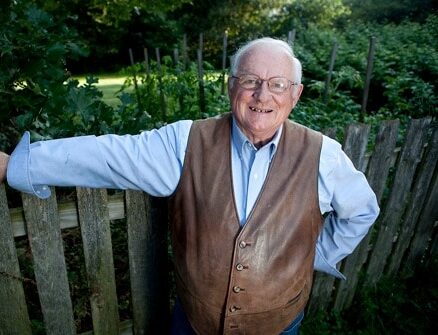My phone interview with Jerry Apps last week was not only enlightening, but emotional. The 87-year-old is the author of over 40 books. He’s also the amazing but humble star in many PBS documentaries about the land and farming in the 50s.
We share a publisher, and during a Zoom meeting he told a story—as only Jerry can—of a farmer’s wife who approached him after one of his presentations. She credited him with saving her husband’s life. She told Jerry that her husband had been severely depressed, possibly even suicidal, until he began reading Jerry’s books.
“Farmers have a high suicide rate,” Jerry explained. “Due to the loss of the small family farm, many of them feel they have failed. Failed their grandparents. Failed their parents. And failed their children who will not experience the joys of farm life.” Jerry strives to show them their worth.
Jerry’s voice revealed his genuine empathy for the farmer. He could relate since at age twelve, he developed polio. As a farmer’s son, losing the use of his right leg made him feel worthless.“That’s a terrible feeling,” Jerry said, his voice filled with emotion.
Fortunately, Jerry was able to restore his self-image through his words and his ability to tell stories. He also eventually regained the use of his leg.
Many of Jerry’s recent writings focus on showing people, especially those who work the land, that they are important, even vital to this world. In his recent novel, Settlers Valley, he extols the power of getting back to nature and our community, especially for veterans, those suffering with PTSD, or those needing healing.
I suspect the depressed husband who was helped by Jerry’s writing found comfort in seeing the value of his farming career, but I also suspect Jerry’s books triggered happy memories for him. Jerry’s young adult book, Wild Oak, has a line that made me think of the depressed farmer. The main character Billy says, “Mostly, I guess, I had come to love the land, the smell of freshly turned soil in the spring when the plow’s mold-board created long ribbons of brown from fencerow to fencerow.” If the farmer read that, he would surely remember a similar experience and spend a moment reliving a happier time.
I guarantee that if you read Jerry Apps’ books, you’ll have a similar experience. One scene from Wild Oak that resonated with me described Billy hunkering down on his belly and looking into an ice fishing hole. Jerry’s words inspired a flashback of ice fishing with my father and laying down on the ice near a hole in a shallow lake. My father, who was not a demonstrative man and would never have told me he loved me, took off his coat and lovingly covered me with it. The underwater world captivated me. I spotted gently flowing underwater weeds and even a fish. It was a tender memory that I cherish.
I also connected with this descriptive wintery paragraph from Wild Oak. “Heavy frost covered the dead grass and hung on the dried heads of the timothy, on the wooden fence that enclosed the barnyard, on the cobwebs that had been meticulously woven from the corner of the barn to the beginning of the fence boards.” And just like that, I’m crunching through deep snow to make my way inside the snug horse barn on a pleasantly crisp winter day. I’m smelling the comforting sweet molasses grain mixed with the warm scent of horses.
When I read Jerry’s works, I feel like I get to curl up in a comfy chair. I breathe easier, and I suspect the same is, or will be, for you too. It was true for a dying father from Dodgeville.
His daughter contacted Jerry a year or so ago to let him know her father had just passed away. “While he was dying,” the daughter said, “Dad asked me to read from one of your books.”
“That about set me off my chair,” Jerry told me.
Writers want their words to make a difference in people’s lives, but even if we’re not all writers, we can help people who are struggling by simply listening. As a former college professor, Jerry has counseled many students, some with serious issues. He’s found that if he has people start by telling a story of something that’s happened in their life, they will open up. Many times, the simple act of listening is enough to help the person. He mentioned that we all can do this and gave the example of times when a friend or neighbor stops over for a chat. After listening for a while, the person finally brings up what was really on his or her mind. Simply by showing interest, we can help that person.
Jerry finds great satisfaction in knowing that he has helped people and made a difference. If you haven’t read his work, grab a cozy blanket. Treat yourself to the rocking chair cadence of his words; start with a story.
(Photo courtesy of Steve Apps)


5 Replies to “Start with a Story”
Great article, always enjoy
Your approach and now I need to look into Jerry Apps books! Thanks
Great article, always enjoy Your approach and stories. I need to look into Jerry Apps books! Next. Thanks so much..
Thanks for the comment, Margo. Yes, check out Jerry’s books and consider writing one yourself based on your awesome travels and accomplishments.
Jerry Apps is a Wisconsin treasure. I discovered his writings about 15 years ago, and as you say, they transport a reader to times past, that moment in childhood when one watched the clouds drift by and dreamed of horses and castles in the air. But Jerry also reminds us all, that the essence of life is tapped into by reaquainting ourselves to the natural world around us and reconnecting to the people in our community.
Beautifully said, Sandi. Yes, Jerry is a Wisconsin treasure.